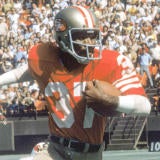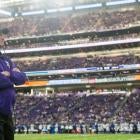No team has ever played at home in the Super Bowl. In 51 games, there has not been a single team that's gotten the unique advantage of playing in front of its home crowd. The Super Bowl is meant to be a neutral site game, but the Vikings have a chance to change that this year. They're the second seed in the NFC, and they could play two games at home or have to travel to Philadelphia to face the Eagles, sans Carson Wentz, in the NFC Championship.
Either way, it has been a long time since a team has had the shot that the Vikings do. When the Vikings host the Saints on Sunday (4:40 ET, FOX), it will mark the first time in NFL history that a Super Bowl host has played a divisional game at home. And if the Vikings make it all the way to the Super, undermining the neutral site game, the league's events crew already has a plan to try and curb the home field advantage.
"We're watching it closely, no question about it, and we have been for a while," Peter O'Reilly, the league's senior vice president of events, told Sports Illustrated. "The good thing is there is a really detailed contingency plan in place that hasn't had to be rolled out before, but is in place. We've been talking with the Vikings and the host committee throughout the back-half of this regular season on a regular basis on all the different scenarios. It adds another factor for sure, but we feel good about the planning in place."
Throughout the Super Bowl's history, there have been two games that were, in essence, home games. The 1979 Los Angeles Rams played the Pittsburgh Steelers in Super Bowl XIV at The Rose Bowl; and the 1984 San Francisco 49ers played the Miami Dolphins in Super Bowl XVIX, played at Stanford Stadium. To circumvent home field, the NFL first took the host team's 15 percent of tickets and divvied that up equally. "Home" teams also stayed in hotels rather than their homes.
Teams also practiced at home during Super Bowl week, which the NFL allowed at the time. "We are very focused on making sure that the two facilities are equitable, and our football operations side takes a lot of time to make sure the two facilities that we're delivering to the two Super Bowl teams have equivalent facilities in terms of space, opportunity for meeting rooms and access to facilities and weight rooms," O'Reilly told SI. "A lot of time and energy goes into that. If you're in your own facility it's what you know and you're comfortable with that."
Home-field advantage on the field, however, may not be a huge concern. Ticket sales are divided equally, and although there would invariably be a Vikings' bias, the Super Bowl is largely a media and corporate event. A lot of guests are fans of football, or don't have a vested interest in the game. That isn't always the case, and of course there is always the rabid fan turnout, but it isn't the same as the rest of the playoffs.
Although the Vikings possibly playing at home raises a lot of issues, they still have to win two games to get there. And if they do get in the Super Bowl, the NFL at least has a plan in place to keep things as fair as possible.






















